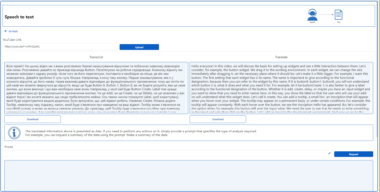MCP Server: Unlocking Persistent Memory for AI with Local Knowledge Graphs
In the realm of artificial intelligence, the ability to remember and utilize past interactions is crucial for creating personalized and efficient user experiences. The MCP Server, with its innovative use of local knowledge graphs, offers a robust solution for persistent memory, enabling AI models like Claude to retain and access user information across multiple interactions. This overview delves into the key features, use cases, and integration of MCP Server within the UBOS platform, illustrating how it stands out in the competitive landscape of AI memory solutions.
Key Features of MCP Server
1. Local Knowledge Graphs
The core of the MCP Server is its use of local knowledge graphs. These graphs serve as a structured repository of information, where entities and their relationships are stored and managed efficiently. Each entity in the graph is uniquely identified and can belong to various types such as ‘person’, ‘organization’, or ‘event’. This structure not only facilitates easy retrieval of information but also allows for complex data interactions to be mapped and understood.
2. Persistent Memory
Unlike traditional ephemeral memory systems, MCP Server ensures that the information is retained persistently. This means that once data is stored, it remains accessible for future interactions, allowing for a seamless continuity in user experience. The server’s ability to track the evolution of knowledge through versioning further enhances its utility, providing a historical context to the data.
3. Customizable Memory Path
MCP Server provides flexibility in managing memory paths. Users can specify custom paths for memory files either through command-line arguments or environment variables. This customization ensures that data storage aligns with the specific needs and infrastructure of the user, enhancing the adaptability of the system.
4. Comprehensive API
The MCP Server boasts a comprehensive API that includes functionalities for creating entities and relations, adding and deleting observations, and searching nodes. This API is designed to be intuitive and robust, enabling developers to seamlessly integrate the server into their applications and leverage its full potential.
Use Cases of MCP Server
1. Personalized Chatbots
One of the primary applications of MCP Server is in the development of personalized chatbots. By retaining user information across sessions, these chatbots can offer tailored responses and recommendations, significantly enhancing user satisfaction and engagement.
2. Customer Relationship Management (CRM)
In CRM systems, the ability to remember customer interactions and preferences is invaluable. MCP Server can integrate with CRM platforms to provide a persistent memory layer, ensuring that every customer interaction is informed by past engagements, thereby improving service quality and customer retention.
3. Knowledge Management Systems
Organizations can leverage MCP Server to build comprehensive knowledge management systems. By organizing information into entities and relationships, these systems can provide employees with quick access to relevant data, facilitating informed decision-making and boosting productivity.
Integration with UBOS Platform
UBOS, the full-stack AI agent development platform, offers a seamless integration with MCP Server. This integration allows developers to orchestrate AI agents that are not only intelligent but also context-aware. By connecting AI agents with enterprise data through MCP Server’s persistent memory, UBOS enables businesses to build custom AI solutions that are both powerful and adaptable.
Benefits of Using UBOS with MCP Server
- Enhanced AI Capabilities: The integration of MCP Server into UBOS enhances the capabilities of AI agents by providing them with a reliable memory system.
- Scalable Solutions: UBOS’s scalable architecture ensures that the benefits of MCP Server can be extended across various business departments and use cases.
- Ease of Development: With UBOS, developers can easily build and deploy AI agents that leverage the persistent memory of MCP Server, reducing development time and complexity.
Conclusion
The MCP Server is a game-changer in the field of AI memory solutions. Its innovative use of local knowledge graphs for persistent memory, coupled with its comprehensive API and seamless integration with the UBOS platform, makes it an ideal choice for businesses looking to enhance their AI capabilities. Whether it’s for personalized chatbots, CRM systems, or knowledge management, MCP Server provides the tools necessary to create intelligent, context-aware applications that deliver exceptional user experiences.
Persistent Knowledge Graph
Project Details
- itseasy21/mcp-knowledge-graph
- @itseasy21/mcp-knowledge-graph
- Last Updated: 4/18/2025
Recomended MCP Servers
A simple MCP ODBC server using FastAPI, ODBC and SQLAlchemy.

MCP Server to retrieve documentation for a package
Examples and tutorials for building AI applications with watsonx.ai Flows Engine
A self-hostable sandbox for MCP and AI agents.

Model Context Procotol(MCP) server for using Amazon Bedrock Nova Canvas to generate images

An MCP server for OBS

A working pattern for SSE-based MCP clients and servers

AI-powered local MCP server for terminal commands, surgical file editing, process management, and intelligent codebase exploration. FastMCP-powered, file...
 From vibe coding to vibe deployment. UBOS MCP turns ideas into infra with one message.
From vibe coding to vibe deployment. UBOS MCP turns ideas into infra with one message.






